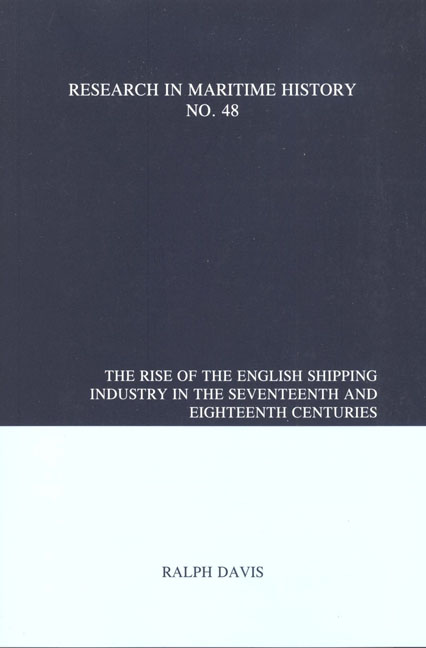Book contents
- Frontmatter
- Contents
- Introduction to the 2012 Edition
- Series Editor's Note
- Introduction
- Preface
- Chapter 1 The Widening of Horizons, 1560-1689
- Chapter 2 Consolidation, 1689-1775
- Chapter 3 Ships and Shipbuilders in the Seventeenth Century
- Chapter 4 Ships and Shipbuilders in the Eighteenth Century
- Chapter 5 The Shipowners
- Chapter 6 The Merchant Seamen
- Chapter 7 The Pay and Conditions of Merchant Seamen
- Chapter 8 Shipping Management and the Role of the Master
- Chapter 9 Shipping and Trade
- Chapter 10 The Nearby and Northern European Trades
- Chapter 11 The Southern European and Mediterranean Trades
- Chapter 12 The East Indian Trade
- Chapter 13 The American and West Indian Trades
- Chapter 14 The Government and the Shipping Industry
- Chapter 15 War and the Shipping Industry
- Chapter 16 Four Ships and Their Fortunes
- Chapter 17 Was It a Profitable Business?
- Chapter 18 Conclusion
- Appendix A A Note on the Shipping Statistics, 1686-1788
- Appendix B Sources for the History of the Shipping Industry
- Index
Chapter 5 - The Shipowners
- Frontmatter
- Contents
- Introduction to the 2012 Edition
- Series Editor's Note
- Introduction
- Preface
- Chapter 1 The Widening of Horizons, 1560-1689
- Chapter 2 Consolidation, 1689-1775
- Chapter 3 Ships and Shipbuilders in the Seventeenth Century
- Chapter 4 Ships and Shipbuilders in the Eighteenth Century
- Chapter 5 The Shipowners
- Chapter 6 The Merchant Seamen
- Chapter 7 The Pay and Conditions of Merchant Seamen
- Chapter 8 Shipping Management and the Role of the Master
- Chapter 9 Shipping and Trade
- Chapter 10 The Nearby and Northern European Trades
- Chapter 11 The Southern European and Mediterranean Trades
- Chapter 12 The East Indian Trade
- Chapter 13 The American and West Indian Trades
- Chapter 14 The Government and the Shipping Industry
- Chapter 15 War and the Shipping Industry
- Chapter 16 Four Ships and Their Fortunes
- Chapter 17 Was It a Profitable Business?
- Chapter 18 Conclusion
- Appendix A A Note on the Shipping Statistics, 1686-1788
- Appendix B Sources for the History of the Shipping Industry
- Index
Summary
The London directories of the eighteenth century leave their readers in no doubt that the city was a great seaport. These small volumes list an abundance of craftsmen and dealers whose occupations depended on the sea, and who served the owners of ships - ropemakers and anchorsmiths, blockmakers and sailmakers, ship chandlers, ship insurers, shipwrights, shipbrokers, even ships’ husbands. Yet one absentee will be noticed; the shipowner himself. Until the eighteenth century was very far advanced, shipowning was no man's trade; instead, it was a minor function of people whose most important interests and investments lay elsewhere. Most shipowners were merchants, most merchants were at some time shipowners, but shipowning claimed only a small proportion of each man's capital, and received a correspondingly small share of his time and attention. Only when the Industrial Revolution was changing the scale of English commerce did shipowning become an occupation in its own right; the London shipowner, so described in the directory, does not appear until 1815.
The merchant-cum-shipowner was in no way unusual in the diversity of his occupations. Seventeenth-century business was not altogether ripe for intense specialization, and as late as 1780 the division of labour was seen more in industry than in commerce. The merchant of the seventeenth or eighteenth century might describe himself, for example, as “Turkey merchant” or “Russia merchant,” yet be ready to take part in a wide range of business affairs beyond his special field; bargains in Baltic flax, Maryland tobacco, Scottish linen or Dutch madder could all attract him. Among such possible side interests, none was more commonly followed then shipowning. If we lift our eyebrows at the sight of Richard Thompson and Co., bankers owning “parts of East India shipping” we should notice that this was but one of “several advantageous and profitable trades” into which they put the money deposited by their customers; they invested in the silk, wine and Russia trades, in lead mining in Wales and linen manufacture in Ireland, and indeed “omitted nothing within the compass of our ingenuity.”
- Type
- Chapter
- Information
- The Rise of the English Shipping Industry in the Seventeenth and Eighteenth Centuries , pp. 77 - 104Publisher: Liverpool University PressPrint publication year: 2012



